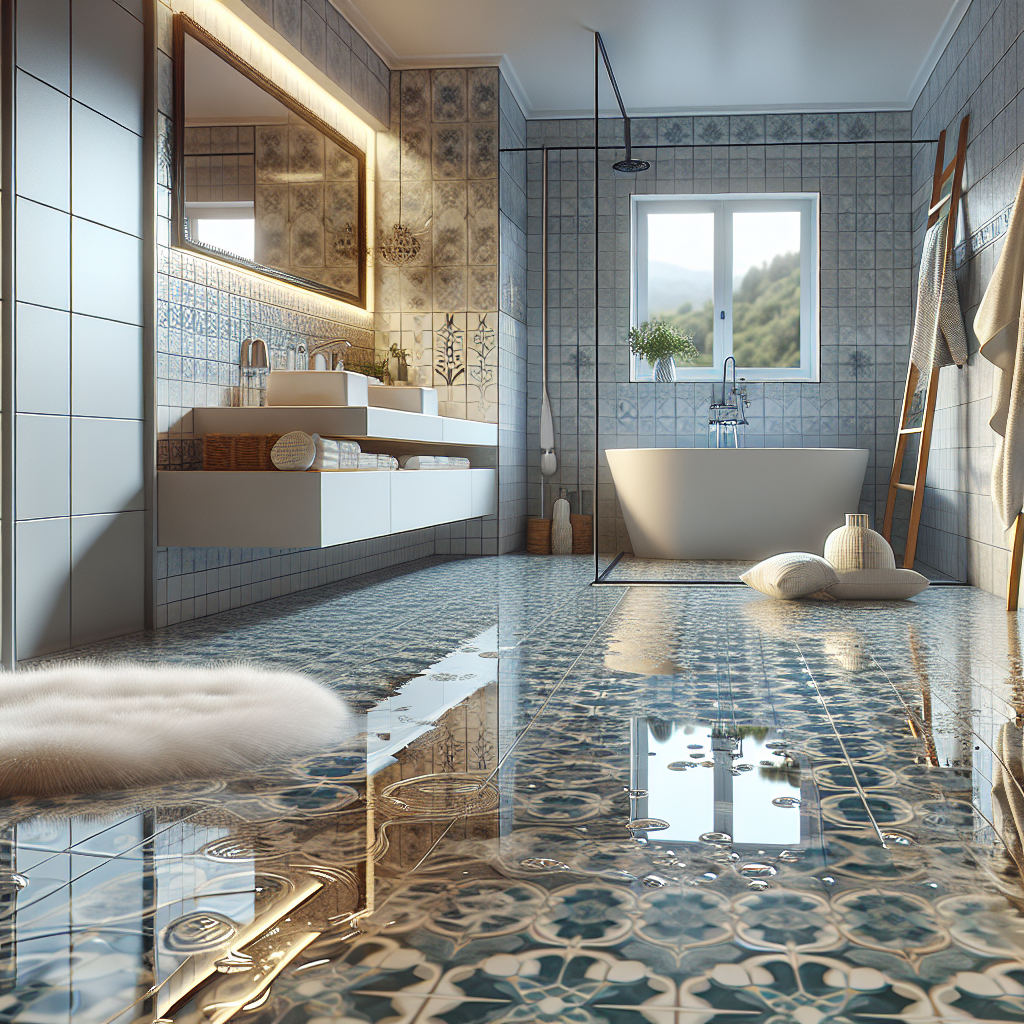Best Waterproof Flooring for Bathrooms

When it comes to choosing flooring for your bathroom, one of the most important factors to consider is its ability to withstand moisture. Bathrooms are high-moisture areas, prone to spills, splashes, and humidity. Therefore, it is crucial to select a flooring material that is not only aesthetically pleasing but also durable and waterproof. In this article, we will explore the best waterproof flooring options for bathrooms, backed by research, examples, and statistics.
Types of Waterproof Flooring
Before diving into the specific flooring options, let’s take a look at the different types of waterproof flooring available for bathrooms:
- Vinyl Flooring: Vinyl flooring is a popular choice for bathrooms due to its excellent water resistance. It is available in various styles, including luxury vinyl planks (LVP) and luxury vinyl tiles (LVT). Vinyl flooring is not only waterproof but also highly durable and easy to maintain.
- Ceramic and Porcelain Tiles: Tiles made of ceramic or porcelain are another excellent choice for bathroom flooring. These tiles are inherently waterproof and can withstand high levels of moisture. They come in a wide range of designs, colors, and sizes, allowing you to create a personalized look for your bathroom.
- Natural Stone: Natural stone, such as granite, marble, or slate, can also be used as waterproof flooring in bathrooms. These materials are naturally resistant to water and provide a luxurious and elegant look. However, they require regular sealing to maintain their waterproof properties.
- Laminate Flooring: While laminate flooring is not inherently waterproof, some manufacturers offer laminate options with water-resistant properties. These laminates have a protective layer that prevents water from seeping into the core. However, it is important to note that laminate flooring can still be damaged by excessive moisture if not properly maintained.
- Rubber Flooring: Rubber flooring is a less common but highly durable and waterproof option for bathrooms. It provides excellent slip resistance and is easy to clean. Rubber flooring is often used in commercial settings but can also be a suitable choice for residential bathrooms.
Factors to Consider when Choosing Waterproof Flooring
When selecting the best waterproof flooring for your bathroom, it is essential to consider several factors:
1. Water Resistance
The primary consideration should be the flooring’s ability to resist water. Look for materials that are explicitly marketed as waterproof or water-resistant. Ensure that the flooring has a protective layer or a sealed surface to prevent water from seeping through.
2. Durability
Bathrooms are high-traffic areas, so it is crucial to choose a flooring material that can withstand daily wear and tear. Consider the durability of the material and its ability to resist scratches, stains, and impacts.
3. Slip Resistance
Bathrooms can become slippery when wet, increasing the risk of accidents. Look for flooring options that offer good slip resistance, especially if you have young children or elderly individuals in your household. Textured surfaces or materials with built-in slip-resistant properties can help enhance safety.
4. Maintenance
Consider the maintenance requirements of the flooring material. Some options may require regular sealing or special cleaning products, while others are more low-maintenance. Choose a flooring material that fits your lifestyle and maintenance preferences.
5. Aesthetics
Lastly, consider the overall look and design of the flooring. Bathrooms are often considered a sanctuary, and the flooring plays a significant role in creating a visually appealing space. Choose a flooring material that complements your bathroom’s style and enhances its overall aesthetics.
Best Waterproof Flooring Options for Bathrooms
Now that we have discussed the types of waterproof flooring and the factors to consider, let’s explore some of the best options available:
1. Luxury Vinyl Planks (LVP)
Luxury vinyl planks (LVP) are an increasingly popular choice for bathroom flooring. They mimic the look of hardwood flooring while offering superior water resistance. LVP is made of multiple layers, including a waterproof core, a printed design layer, and a protective wear layer. It is available in a wide range of styles, colors, and textures, allowing you to achieve the desired aesthetic for your bathroom.
LVP is not only waterproof but also highly durable and easy to maintain. It can withstand moisture, spills, and high humidity without warping or deteriorating. Additionally, LVP is softer underfoot compared to ceramic tiles, making it more comfortable to walk on. It also provides better sound insulation, reducing noise transmission between floors.
2. Ceramic and Porcelain Tiles
Ceramic and porcelain tiles have long been a popular choice for bathroom flooring due to their excellent water resistance and durability. These tiles are made from natural clay materials and fired at high temperatures, resulting in a dense and waterproof surface.
Ceramic and porcelain tiles come in various sizes, shapes, and designs, allowing you to create unique patterns and styles in your bathroom. They are easy to clean and maintain, making them a practical choice for busy households. However, it is important to ensure proper installation and sealing of the grout lines to maintain the waterproof properties of the tiles.
3. Natural Stone
Natural stone, such as granite, marble, or slate, can add a touch of luxury and elegance to your bathroom. These materials are naturally waterproof and highly durable. However, it is important to note that natural stone requires regular sealing to maintain its waterproof properties.
Granite is a popular choice for bathroom countertops and flooring due to its durability and resistance to stains and scratches. Marble, on the other hand, provides a luxurious and timeless look but requires more maintenance. Slate is a durable and slip-resistant option, making it suitable for bathroom floors.
4. Rubber Flooring
Rubber flooring is a unique and highly durable option for bathroom flooring. It is naturally waterproof and provides excellent slip resistance, making it a safe choice for wet areas. Rubber flooring is available in various colors and textures, allowing you to create a modern and stylish bathroom.
One of the key advantages of rubber flooring is its resilience and shock-absorbing properties. It is comfortable to walk on and can withstand heavy foot traffic without showing signs of wear. Rubber flooring is also easy to clean and maintain, requiring only regular sweeping and occasional mopping.
Frequently Asked Questions about “Best Waterproof Flooring for Bathrooms”
1. Can hardwood flooring be used in bathrooms?
No, hardwood flooring is not recommended for bathrooms due to its poor water resistance. Hardwood is susceptible to warping, swelling, and damage when exposed to moisture. However, you can achieve a similar look with luxury vinyl planks (LVP) that mimic the appearance of hardwood while offering superior water resistance.
2. Is laminate flooring a good choice for bathrooms?
Laminate flooring can be a suitable choice for bathrooms if you opt for water-resistant laminates. These laminates have a protective layer that prevents water from seeping into the core. However, it is important to note that laminate flooring can still be damaged by excessive moisture if not properly maintained.
3. How do I maintain waterproof flooring in my bathroom?
The maintenance requirements for waterproof flooring vary depending on the material. However, some general tips for maintaining waterproof flooring in bathrooms include:
- Regularly sweep or vacuum the floor to remove dirt and debris.
- Wipe up spills and splashes immediately to prevent water damage.
- Use a mild, non-abrasive cleaner and a damp mop for regular cleaning.
- Follow the manufacturer’s guidelines for specific maintenance instructions.
- Ensure proper ventilation in the bathroom to reduce humidity levels.
4. Can I install waterproof flooring myself?
While some waterproof flooring options can be installed as a DIY project, it is recommended to hire a professional for optimal results. Improper installation can compromise the waterproof properties of the flooring and lead to issues such as water damage or mold growth. A professional installer will ensure proper preparation, sealing, and installation techniques.
5. How much does waterproof flooring for bathrooms cost?
The cost of waterproof flooring for bathrooms varies depending on the material, quality, and installation method. Luxury vinyl planks (LVP) and ceramic tiles are generally more affordable options, while natural stone can be more expensive. It is best to obtain quotes from different suppliers and contractors to get an accurate estimate for your specific project.
Summary
Choosing the best waterproof flooring for your bathroom is essential to ensure durability, water resistance, and aesthetics. Luxury vinyl planks (LVP), ceramic and porcelain tiles, natural stone, and rubber flooring are among the top choices for bathrooms. Consider factors such as water resistance, durability, slip resistance, maintenance, and aesthetics when making your decision. Remember to consult with professionals and obtain quotes to ensure a successful installation. With the right waterproof flooring, you can create a beautiful and functional bathroom that withstands the test of time.

